Keynote Opening: Empowered by Data – Setting a Roadmap for Impactful Transformation
• Insights for impact
• Growing data culture and talent
• Building strong data foundations
• Navigating the implementation journey
Speaking:

Evelyn Wareham
Chief Data & Insights Officer, Ministry of Business, Innovation and Employment
The Changing Landscape of Data - Overcoming Constraints, Enabling Self-Service
Over the past few years we have seen a rapid transition to the cloud due to Covid and an accelerated perspective on data in cloud and data management. Pre Covid data projects were often not understood by executives and hence not given priority or budget. Although change is in the midst, the corporate governance community need to continue the education across enterprise and government to garner support for business-critical data projects, however they are facing new constraints such as finding skilled resources, controlling increasing complexity and cost overruns.
Alex Newman will detail Informatica’s (the market leader in cloud data management) insights into 2022 data management priorities, including intelligent data governance, self-service data democratisation, data quality, integration, and the divergence from single cloud, and how you can continue to drive improved executive support and engagement. He’ll be drawing on best practice and case studies seen in New Zealand and the global market.
Speaking:

Alex Newman
Sales Director, Informatica
The Changing Landscape of Data - Overcoming Constraints, Enabling Self-Service
July 7 | 09:30 - 09:55
Over the past few years we have seen a rapid transition to the cloud due to Covid and an accelerated perspective on data in cloud and data management. Pre Covid data projects were often not understood by executives and hence not given priority or budget. Although change is in the midst, the corporate governance community need to continue the education across enterprise and government to garner support for business-critical data projects, however they are facing new constraints such as finding skilled resources, controlling increasing complexity and cost overruns.
Alex Newman will detail Informatica’s (the market leader in cloud data management) insights into 2022 data management priorities, including intelligent data governance, self-service data democratisation, data quality, integration, and the divergence from single cloud, and how you can continue to drive improved executive support and engagement. He’ll be drawing on best practice and case studies seen in New Zealand and the global market.
Speaking:
Keynote Strategy Panel: Driving Data Talent from Within: Recruit, Retain and Upskill NZ
Even before the border closed, attracting and retaining data talent in the long-term was an incredible challenge – now it is reaching alarming levels of concern. This session will look at strategies that will support New Zealand growing its own talent, from university partnerships to upskilling and retaining current teams – what is the best strategy moving forward?
• Upskilling current teams to match the fast changing pace of the data world
• Working with universities to drive talent creation and other unique strategies
• Which post-pandemic hiring strategies have successfully kept talent?
Speaking:

Kevin Ross
CEO, Precision Driven Health

Tracy Parsons
Chief Data Officer, New Zealand Ministry of Foreign Affairs & Trade | Manatū Aorere

Kate Kolich
Assistant Governor/General Manager Information, Data and Analytics, Reserve Bank of New Zealand – Te Pūtea Matua

Jan Sheppard
Chief Data and Analytics Officer, ESR – Science for Communities
Keynote Strategy Panel: Driving Data Talent from Within: Recruit, Retain and Upskill NZ
July 7 | 09:55 - 10:30
Even before the border closed, attracting and retaining data talent in the long-term was an incredible challenge – now it is reaching alarming levels of concern. This session will look at strategies that will support New Zealand growing its own talent, from university partnerships to upskilling and retaining current teams – what is the best strategy moving forward?
• Upskilling current teams to match the fast changing pace of the data world
• Working with universities to drive talent creation and other unique strategies
• Which post-pandemic hiring strategies have successfully kept talent?
Speaking:
Mind The Gap
There is a noticeable disconnect between how companies perceive their personalisation efforts and how we consumers experience them. This personalisation gap is widening as brands fail to keep up with the hurricane of new and increased data resulting from their pandemic fueled scramble when accelerating their digital transformations. The brands who aren’t bridging this gap can expect increased costs in finding audiences and the double whammy of potentially decreasing revenues through lost opportunities of engagement in moments that matter to their customers.
In this interactive presentation Devin will:
- Expose the personalisation gap between brands and their customers
- Review market forces and trends that are widening that gap
- Highlight common obstructions to providing a better customer experience
- Propose an approach that brands can use to close the gap
- Share some lessons learnt from the field
Speaking:

Devin Deen
Associate Partner, Data & Analytics, Servian
Mind The Gap
July 7 | 10:30 - 10:55
There is a noticeable disconnect between how companies perceive their personalisation efforts and how we consumers experience them. This personalisation gap is widening as brands fail to keep up with the hurricane of new and increased data resulting from their pandemic fueled scramble when accelerating their digital transformations. The brands who aren’t bridging this gap can expect increased costs in finding audiences and the double whammy of potentially decreasing revenues through lost opportunities of engagement in moments that matter to their customers.
In this interactive presentation Devin will:
- Expose the personalisation gap between brands and their customers
- Review market forces and trends that are widening that gap
- Highlight common obstructions to providing a better customer experience
- Propose an approach that brands can use to close the gap
- Share some lessons learnt from the field
Speaking:
With More Data, Comes Great Responsibility
Harnessing and protecting the collective power of data is considered to be one of the most significant and attractive opportunities facing modern enterprises today, yet few small businesses understand this new world of data and whom to trust. With only a handful (17%) of small businesses admitting they completely understand what tech providers do with their data beyond delivering products and services, it’s clear this significant opportunity comes with an even greater responsibility.
In 2020, global small business platform, Xero, made a company-wide pledge to use data responsibly. In doing so, it introduced eight commitments to help guide it in every decision involving data use. More recently, Xero made those commitments public which saw it establish a first of its kind ResponsibleData Use Advisory Council and a tailored education offering for small businesses.
Speaking:

Mark Rees
Chief Technology Officer, Xero
With More Data, Comes Great Responsibility
July 7 | 11:25 - 11:50
Harnessing and protecting the collective power of data is considered to be one of the most significant and attractive opportunities facing modern enterprises today, yet few small businesses understand this new world of data and whom to trust. With only a handful (17%) of small businesses admitting they completely understand what tech providers do with their data beyond delivering products and services, it’s clear this significant opportunity comes with an even greater responsibility.
In 2020, global small business platform, Xero, made a company-wide pledge to use data responsibly. In doing so, it introduced eight commitments to help guide it in every decision involving data use. More recently, Xero made those commitments public which saw it establish a first of its kind ResponsibleData Use Advisory Council and a tailored education offering for small businesses.
Speaking:
How Data Privacy Takes the Forefront as Biometrics becomes an Integral Business Function
The speaker will talk about the role of data analysts in relation to data privacy and how this impacts biometrics delivery and processes.
Speaking:

Liz Macpherson
Acting Privacy Commissioner, Privacy Commissioner Te Mana Mātāpono Matatapu
Data Literacy, and Partnerships for Sustaining Change and Scalability
This session will examine Loyalty NZ’s new model that has built a very close partnership between the data and technology teams, and the business teams. We will look at the big results being won as a result of these partnerships, and the lessons learned along the way. It will also look at their data literacy programme, biases and why they matter, and why humans are destined to make bad decisions with data.
Speaking:

Brian Ferris
C3O - Chief Data, Analytics & Technology Officer, Loyalty New Zealand
Data Literacy, and Partnerships for Sustaining Change and Scalability
July 7 | 12:15 - 12:40
This session will examine Loyalty NZ’s new model that has built a very close partnership between the data and technology teams, and the business teams. We will look at the big results being won as a result of these partnerships, and the lessons learned along the way. It will also look at their data literacy programme, biases and why they matter, and why humans are destined to make bad decisions with data.
Speaking:
DevOps and Data Agility: Embracing a Data Flexible Environment
Data, DevOps and Agility together serve as the next stage in a more flexible, best-in-class data management and usage strategy.
Speaking:

Andrew Mills
Head of Data Delivery, Data & Analytics, ANZ
Design, Observe and Evaluate Impactful Decisions to Achieve Effective Business Strategies
- Creating a flexible, sustainable, measurable decision-making framework
- Decision-making with data, information, knowledge and wisdom – Bring on the systems thinking perspective
- Design Thinking & Human in the loop architecture to increase trust in AI augmented decision making
Speaking:

Ganesh Selvaraj
Data, Analytics & AI – Architect, Principal Data Scientist, Advanced Analytics & AI Lead, WorkSafe New Zealand
Design, Observe and Evaluate Impactful Decisions to Achieve Effective Business Strategies
July 7 | 14:05 - 14:40
- Creating a flexible, sustainable, measurable decision-making framework
- Decision-making with data, information, knowledge and wisdom – Bring on the systems thinking perspective
- Design Thinking & Human in the loop architecture to increase trust in AI augmented decision making
Speaking:
Digital Preservation and Data Lifecycle Management: Innovation for Insight
- Driving efficiency: Managing, transferring and migrating digital archives to the cloud: The challenges for structured and unstructured content over time
- Driving usability: Using AI/ML tooling to retro-actively apply policy and compliance through retro-metatagging for data access, control and management, e.g. Privacy Act, Māori Data Sovereignty, and Public Records Act retention and disposal, etc.
- Driving accuracy: Maintaining data lineage through data aggregation and re-use to drive greater accuracy of business intelligence and analytics
Speaking:

Stephen Clarke
Chief Archivist, Kaipupuri Matua Archives New Zealand
Digital Preservation and Data Lifecycle Management: Innovation for Insight
July 7 | 14:40 - 15:15
- Driving efficiency: Managing, transferring and migrating digital archives to the cloud: The challenges for structured and unstructured content over time
- Driving usability: Using AI/ML tooling to retro-actively apply policy and compliance through retro-metatagging for data access, control and management, e.g. Privacy Act, Māori Data Sovereignty, and Public Records Act retention and disposal, etc.
- Driving accuracy: Maintaining data lineage through data aggregation and re-use to drive greater accuracy of business intelligence and analytics
Speaking:
Discussion Group: Data: The Asset that Powers Growth
-
Tackling the Inherent Tensions of the Data Marketplace. Infonomics is increasingly becoming common practice in many large organisations, particularly concerning data sharing.
-
How are organisations balancing the perceived value of their own data vs the opportunity of data sharing to create new value
-
What are some practical examples of profitable data sharing arrangements?
-
Sharing data can generate revenue, but in what form?
-
How are organisations managing GDPR and an increasing awareness of Personally Identifiable Data.
-
What is the way forward? Cost versus benefit of sharing data: When is it too high?
Speaking:

Tom Lintern
Head of Data Science, Trade Me
Discussion Group: Data: The Asset that Powers Growth
July 7 | 15:15 - 15:50
-
Tackling the Inherent Tensions of the Data Marketplace. Infonomics is increasingly becoming common practice in many large organisations, particularly concerning data sharing.
-
How are organisations balancing the perceived value of their own data vs the opportunity of data sharing to create new value
-
What are some practical examples of profitable data sharing arrangements?
-
Sharing data can generate revenue, but in what form?
-
How are organisations managing GDPR and an increasing awareness of Personally Identifiable Data.
-
What is the way forward? Cost versus benefit of sharing data: When is it too high?
Speaking:
A Data Maturity Assessment for the Aotearoa New Zealand Government Data System
Data maturity assessments currently in circulation are not positioned to deliver a meaningful view of data practice across the Aotearoa New Zealand government data system, due to limitations in coverage, scale, currency, or language. With data taking on an increasingly critical role in the daily operation of government, as well as the way we address national challenges and engender trust in our public institutions, an authentic and transparent view of its state is paramount.
This session details a capabilities-based model and new approach to assessing data maturity, providing agencies a means of improving their data practice and planning, while generating information to help characterise the health of the wider government data system.
Speaking:

Kevin Sweeney
Principal Advisor – Data System Capability, Tatauranga Aotearoa Stats NZ
A Data Maturity Assessment for the Aotearoa New Zealand Government Data System
July 7 | 16:20 - 16:45
Data maturity assessments currently in circulation are not positioned to deliver a meaningful view of data practice across the Aotearoa New Zealand government data system, due to limitations in coverage, scale, currency, or language. With data taking on an increasingly critical role in the daily operation of government, as well as the way we address national challenges and engender trust in our public institutions, an authentic and transparent view of its state is paramount.
This session details a capabilities-based model and new approach to assessing data maturity, providing agencies a means of improving their data practice and planning, while generating information to help characterise the health of the wider government data system.
Speaking:
Closing with Bubbles: Using Analytics and Data Literacy to Support Better Outcomes for a diverse range of users
Capital & Coast DHB’s implementation of the national Care Capacity Demand Management (CCDM) programme has received a lot of attention within the health sector because of the way it has comprehensively supported clinical leaders to use data to improve outcomes for patients and staff alike. This includes making core data metrics available from ward to board and ensuring that leaders are able to interpret the data through a data literacy programme. CCDM has also been used to test a competency-based approach to data literacy that is now being rolled out to management accountants, operational managers and HR advisors.
This case study will take you through the journey, explore the lessons learned and how those lead to continuous improvement, how to make things work in a very difficult environment and the importance of tailoring your approach to the diverse needs of different users.
Speaking:

Stuart McCaw
Programme Manager, Capital & Coast District Health Board

Emma Joines
CCDM Programme Manager, Capital & Coast District Health Board
Closing with Bubbles: Using Analytics and Data Literacy to Support Better Outcomes for a diverse range of users
July 7 | 16:45 - 17:10
Capital & Coast DHB’s implementation of the national Care Capacity Demand Management (CCDM) programme has received a lot of attention within the health sector because of the way it has comprehensively supported clinical leaders to use data to improve outcomes for patients and staff alike. This includes making core data metrics available from ward to board and ensuring that leaders are able to interpret the data through a data literacy programme. CCDM has also been used to test a competency-based approach to data literacy that is now being rolled out to management accountants, operational managers and HR advisors.
This case study will take you through the journey, explore the lessons learned and how those lead to continuous improvement, how to make things work in a very difficult environment and the importance of tailoring your approach to the diverse needs of different users.


